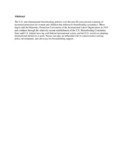| dc.contributor.author | Humenick, SS | |
| dc.contributor.author | Gwayi-Chore, MO | |
| dc.date.accessioned | 2013-06-11T14:01:55Z | |
| dc.date.available | 2013-06-11T14:01:55Z | |
| dc.date.issued | 2001-09 | |
| dc.identifier.citation | J Obstet Gynecol Neonatal Nurs. 2001 Sep-Oct;30(5):529-40. | en |
| dc.identifier.uri | http://hinari-gw.who.int/whalecomwww.ncbi.nlm.nih.gov/whalecom0/pubmed/?term=Gway-choremo | |
| dc.identifier.uri | http://erepository.uonbi.ac.ke:8080/xmlui/handle/123456789/31700 | |
| dc.description.abstract | The U.S. and international breastfeeding policies over the past 80 years present a pattern of increased protection for women and children that influences breastfeeding acceptance. These begin with the Maternity Protection Convention of the International Labor Organization in 1919 and continue through the relatively recent establishment of the U.S. Breastfeeding Committee. State and U.S. federal laws lag well behind international action, and the U.S. record on adopting international initiatives is poor. Nurses can play an influential role in consciousness raising, policy development, and advocacy for breastfeeding support. | en |
| dc.language.iso | en | en |
| dc.publisher | University of Nairobi | en |
| dc.title | Leader or left behind: national and international policies related to breastfeeding | en |
| dc.type | Article | en |
| local.publisher | Department of Public Health,University of Nairobi | en |

